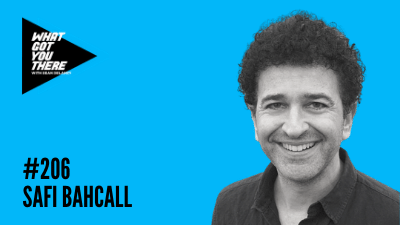#206 Safi Bahcall – Episode Notes

Safi Bahcall is one of the few 2nd time guests on What Got You There which should tell you how much Sean respects him!
Safi was first featured on episode #126 so if you have not heard that pause this and checkout that episode!
Safi was a former physicist turned biotech CEO where he went on to lead his company to IPO and serve as the CEO for 13 years.
Safi is also author of the bestselling book Loonshots: How to Nurture the Crazy Ideas That Win Wars, Cure Diseases, and Transform Industries which is on Bill Gate’s must read list.
Key Takeaways
Safi believes that his superpower in his professional relationships is to keep asking ‘why’
“Part of the secret of really helping people and yourself is to keep asking why”
His guiding principles are curiosity, keeping it simple, and the power of border dwelling.
“Once you start listening with curiosity, people understand that you really care about them”
Failing is something everyone should become comfortable with, especially in business.
“You have to go through those 9 things that don’t work to find that 10th thing that changes the world”
2:43 Safi’s Past Year
His one word to sum it up: Amazing.
Unexpected, so many surprises, interesting new problems and relationships.
● “It’s been an amazing year of connecting, meeting, and getting to know all sorts of interesting people, organizations, and industries” ●
6:09 Safi’s Keys to Helping Companies
The one superpower that has made a huge difference in his professional relationships: Curiosity
Safi cultivates curiosity by asking a lot of questions in order to begin to tease out what’s interesting, different, exciting, what might work.
● “Part of the secret of really helping people and yourself is to keep asking why” ●
14:14 Anger is a Mirror
Safi describes his time as a graduate student, another student made him very mad with his difference in speaking towards his peers vs. professors
He paused and said, why does this make me angry?
Safi then recognized that he acted similar to the professors, and so he realized that his anger wasn’t about the other student, but about himself
● “Whenever I find myself getting angry I say, what is it about me that I’m seeing reflected here that I don’t like?” ●
19:04 Importance of Curiosity
Safi dives into the importance of following your curiosity – incredibly useful and one of his primary guiding principles.
He credits listening with curiosity to help to diffuse tension in conversations and to improve your personal relationships
Ask yourself 10 questions and grade yourself on each of them
Ex: “Have I done my best to listen with curiosity in my personal relationships?”
● “Once you start listening with curiosity, people understand that you really care about them” ●
28:51 Importance of Keeping it Simple
Safi’s second principle is to keep it simple – provide clarity to the people around you
● “If you can’t explain what you’re going to, why you’re going to do it, and why it makes sense, in a way that your mother can understand it, you have a problem” ●
He believes that most successful people can take a complex situation and boil it down and make it simple but not simplistic.
● “Keep it simple, but not simplistic” ●
Safi says that keeping things simple helps to provide others around you with clarity.
39:26 The Power of Dwelling on the Border
Safi credits business success to the phrase “the power of border dwellers” – a placing yourself at the border of different fields or disciplines
Ex: There are history books and science books, but no books that bridge the two of them
● “Living on the border can give you fresh ideas on how to manage your business” ●
Safi explains how Steve Job’s success in Apple the second time occurred because he realized he needed to create a bridge between the creators and operators
● “Read things your competitors aren’t reading that will give you ideas that they might not have” ●
56:01 The Moses Trap
Safi dives into the concept of “The Moses Trap”, which he describes as a problem that occurs when companies have a ‘product person’ at the top.
Product people hey think of innovation as product and they miss the other side of innovation which is in strategy
Safi believes the The Moses Trap will continue on because:
● “Product people will have blind spots and that’s where strategy innovation has a competitive advantage” ●
1:10:33 Safi’s Business Advice
Safi echoes his advice of blending the creators and the operators to create success within a larger business.
● “In one case, you’re trying to take risks, and another you’re trying to minimize risk” ●
Balancing the blend of creators and operators differs between small companies and large companies. In a small team, you need to separate the roles of soldiers and artists.
● “If you are managing a small team, you have to be very good at taking on and off hats” ●
Safi emphasizes the importance of failing and being comfortable with failing.
● “You have to go through those 9 things that don’t work to find that 10th thing that changes the world” ●
1:19:54 Safi’s Framework for Building His Team
Safi looks for 4 things when hiring his team:
#1 Level of raw intelligence and problem solving horsepower
#2 Curiosity
#3 “Would I want to sit next to this person on a plane?” à recognizing trust and teamwork within a person
#4 A level of energy and passion
1:24:16 Safi’s Recommendations
Email Safi at safiatbahcall.com and he’ll send you the first chapter of his book Loonshots for free!
Who would Safi pick for an evening of interviews?
His chosen interview: Johannes Kepler
